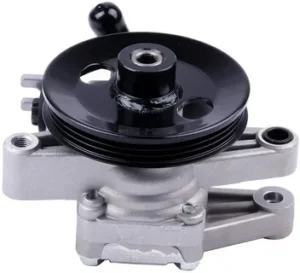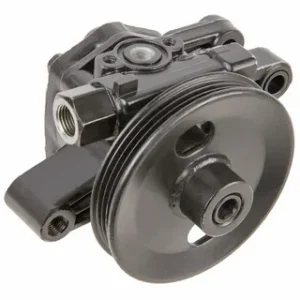Driving the Kia Sportage is a thrilling experience, but have you ever wondered what makes it so enjoyable? One crucial component that plays a significant role in enhancing your ride is the power steering pump. This unsung hero works behind the scenes to ensure smooth and effortless handling, turning even the tightest corners into a breeze. Whether navigating city streets or cruising on highways, understanding how the Kia Sportage Power Steering Pump contributes to your overall driving experience can deepen your appreciation for this remarkable vehicle. Let’s dive into its functions and explore why it matters more than you think!
Overview Of The Power Steering Pump’s Function
The power steering pump, including the Kia Sportage, is crucial in modern vehicles. This essential component directs hydraulic fluid to the steering gear, making it easier for drivers to steer their cars with minimal effort. Without a functioning power steering pump, maneuvering becomes cumbersome and physically demanding.
When you turn the steering wheel, the power steering pump engages immediately. It generates hydraulic pressure that assists in turning the wheels smoothly and precisely. This means less strain on your arms and more control over your vehicle’s direction.
The design of power steering pumps has evolved significantly over time. The Kia Sportage utilizes an efficient system that balances responsiveness with comfort. Thanks to this technology, drivers can effortlessly navigate tight turns or parallel parks.
Moreover, advancements have led to varying types of pumps based on engine specifications and driving demands. Each type is engineered to provide optimal performance tailored specifically for different models within the Sportage lineup.
Understanding how these pumps function helps appreciate their impact on the driving experience. A reliable power steering pump is vital for those who value ease of handling during everyday commutes or long drives.
The Impact of Power Steering on Vehicle Maneuverability
Power steering is a game changer for vehicle maneuverability. This feature simplifies driving in tight spaces and during low-speed maneuvers in the Kia Sportage. With power assistance, drivers can steer with minimal effort, making navigating through crowded parking lots or busy city streets easier.
The power steering system’s responsiveness enhances precision while cornering. It allows smooth transitions as you round bends or navigate curves on winding roads. This improved control boosts driver confidence, especially when tackling sharp turns.
In addition to being easy to use, power steering significantly reduces fatigue during long drives. Without the constant strain of manual steering, drivers can enjoy a more comfortable experience over extended journeys. A relaxed grip means less wear on your hands and arms.
Another factor contributing to maneuverability is how quickly the vehicle reacts to input from the steering wheel. The Kia Sportage’s power steering pump ensures an efficient response time that keeps pace with driver intentions.
The well-functioning power steering also enhances safety. Better handling under various conditions helps prevent accidents by allowing for timely adjustments.
Types Of Power Steering Pumps Used in The Kia Sportage
The Kia Sportage utilizes various power steering pumps designed to enhance driving dynamics. The most common are hydraulic and electric pumps. Hydraulic pumps rely on fluid pressure generated by a belt-driven mechanism. This traditional system provides excellent feedback and control during maneuvers.
Electric power steering (EPS) is another option in newer Sportage models. EPS uses an electric motor to assist with steering, making it lighter and more efficient than its hydraulic counterpart. This technology allows for adjustments based on speed, improving handling at higher velocities.
Variable ratio systems also appear in some variants of the Sportage lineup. These systems adjust the amount of assistance provided depending on how far the driver turns the wheel, offering a more responsive feel at different speeds.
Additionally, some versions may utilize a combination of hydraulic and electric systems, known as hybrid power steering. This blend aims to optimize performance while maintaining fuel efficiency.
Choosing the right type can significantly influence your overall driving experience, impacting everything from comfort to responsiveness behind the wheel.
Benefits Of Power Steering in Everyday Driving
Power steering makes a noticeable difference in everyday driving. It transforms how you interact with your Kia Sportage, making every turn feel effortless. This is particularly beneficial in tight spaces like parking lots or city streets where sharp maneuvers are often necessary.
With power steering, drivers experience reduced physical strain on their arms and shoulders. The system does most of the heavy lifting, allowing for smoother handling without requiring excessive force from the driver. This means longer drives can be more enjoyable and less tiring.
Additionally, improved vehicle control enhances safety on the road. When navigating emergencies or unexpected obstacles, a responsive power steering pump provides immediate feedback to the driver, ensuring better decision-making during critical moments.
The level of precision offered by power steering also boosts confidence behind the wheel. Whether merging onto highways or negotiating winding roads, you’ll appreciate how easily your Kia Sportage responds to even slight movements of the steering wheel.
Enjoying a seamless driving experience contributes to overall satisfaction with your vehicle. A well-functioning Kia Sportage power steering pump elevates daily journeys into something more pleasant and engaging.
How The Power Steering Pump for Kia Sportage Affects Fuel Efficiency
The Power Steering Pump for Kia Sportage plays a crucial role in your Kia Sportage’s overall efficiency. When properly functioning, it allows for smooth and responsive steering, which can positively impact fuel consumption. A well-tuned system means less energy is wasted during driving.
When the pump struggles or fails, drivers often use more muscle to turn the wheel. This extra effort can lead to increased drag on the engine, causing it to work harder than necessary. Consequently, this added strain translates into higher fuel usage.
Also, hydraulic power steering systems may draw significant energy from the engine when turning at low speeds or stationary. If your power steering pump isn’t operating efficiently, this demand can further reduce overall mileage.
Regular maintenance ensures that the Kia Sportage’s power steering system remains in peak condition. Checking fluid levels and maintaining components will help keep everything running smoothly. Addressing any issues promptly also preserves fuel economy.
Investing time in understanding how these elements influence performance pays off by maximizing efficiency and reducing costs over time.
 Common Issues with Power Steering Pumps and Their Symptoms
Common Issues with Power Steering Pumps and Their Symptoms
Power steering pumps are vital for smooth vehicle handling but can encounter issues over time. One common problem is a whining noise when turning the wheel. This often indicates low fluid levels or air in the system, affecting performance.
Another sign of trouble is difficulty in steering, especially during slow maneuvers. If you find it harder than usual to turn the wheel, your power steering pump may be failing. It’s important to address this promptly to avoid more severe damage.
Leaking fluid around the pump is another major red flag. If left unchecked, fluid leaks can lead to insufficient lubrication and eventual pump burnout. Regularly check beneath your vehicle for any signs of fluid pooling.
You might also notice a fluctuating steering feel while driving straight or making turns. This inconsistency signals that your power steering system isn’t functioning properly and could indicate an issue with the pump.
Be on guard for burning smells coming from under the hood. Overheating due to inadequate hydraulic fluid circulation can cause significant problems within the power steering pump, leading to costly repairs.
Maintenance Tips for The Power Steering System
Regular maintenance of the power steering system is essential for ensuring a smooth driving experience in your Kia Sportage. Start by frequently checking the power steering fluid level. Low fluid can lead to increased wear on the pump and reduced performance.
Next, inspect hoses and connections for signs of leaks or damage. Cracks or ruptures in these components can compromise the entire system. If you notice any issues, it’s best to address them promptly to avoid more significant problems later.
Flushing and replacing old power steering fluid is another crucial task. Over time, dirt and debris accumulate in the fluid, impairing functionality. Follow your manufacturer’s recommendations regarding how often this should be done.
Pay attention to unusual noises while turning your steering wheel. A whining or groaning sound may indicate an issue with your power steering pump needing immediate attention.
Consider scheduling periodic inspections with a qualified mechanic who understands Kia vehicles well. They can spot potential issues early on, helping maintain optimal performance as you enjoy every drive in your Sportage.
Upgrading Power Steering Components: Benefits and Considerations
Upgrading power steering components can significantly enhance your driving experience in the Kia Sportage. When you consider improvements, think about better responsiveness and improved handling. Newer technologies can provide a more precise feel, making every turn smoother.
One popular upgrade is an aftermarket power steering pump. These pumps often deliver increased pressure and flow rates compared to stock versions. Your vehicle will require less effort when navigating tight corners or parking situations.
In addition to pumps, upgrading hoses and fittings can improve fluid delivery and reduce leaks. High-performance materials resist wear better than standard options, ensuring longevity for your system.
However, weighing costs against benefits is essential before diving into upgrades. Some components may require professional installation, adding to overall expenses. Always research reputable brands known for quality performance parts tailored specifically for the Power Steering Pump for Kia Sportage.
Consider compatibility with existing systems as well; not all upgrades work seamlessly. Seek advice from experienced mechanics or automotive forums dedicated to Kia enthusiasts before deciding which components best suit your needs.
Conclusion
The Kia Sportage is more than just a stylish SUV; it’s engineered for optimal driving experiences. The power steering pump is pivotal in ensuring smooth handling and responsiveness on the road.
With precise steering control, drivers can confidently navigate tight corners or busy urban streets. This feature greatly enhances overall maneuverability, making every drive enjoyable.
Understanding how the power steering system works enhances your appreciation of this vehicle’s capabilities. It showcases advanced engineering designed specifically for comfort and ease during journeys.
Routine maintenance of the power steering pump ensures that you enjoy its benefits consistently over time. Paying attention to unusual sounds or performance changes can help avoid bigger issues later.
Upgrading components related to the power steering system may offer even greater enhancements. Whether it’s improved response times or better fuel efficiency, these upgrades could elevate your driving experience significantly.
FAQs
What is a power steering pump?
A power steering pump is vital to the steering system that helps drivers maneuver their vehicles easily. It supplies hydraulic fluid to the steering gear, reducing effort when turning the wheel.
How does a faulty power steering pump affect my Kia Sportage?
If your power steering pump malfunctions, you might notice difficulty turning the wheel or hear whining noises when making sharp turns. In extreme cases, it could lead to a complete loss of power assistance.
Can I drive my Kia Sportage without a working power steering pump?
While it’s technically possible to drive without it, doing so would require significant physical effort and could compromise safety during maneuvers.
How often should I have my power steering system checked?
Regular maintenance is key to optimal performance. Your system should be checked every 30,000 miles or as recommended by your vehicle’s manual.
